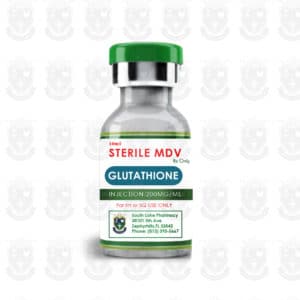Testosterone Cypionate Injection
Dosage Strengths Available: 200mg
Drug Inquiry Form:
Description
Introduction
Testosterone Cypionate Injection is a long-acting form of testosterone replacement therapy (TRT) used to treat men with low or deficient testosterone levels, a condition known as hypogonadism. It helps restore normal hormone balance, improving energy, libido, muscle mass, mood, and overall vitality.
Testosterone Cypionate is one of the most widely prescribed testosterone esters due to its steady release, predictable absorption, and long duration of action—allowing patients to maintain stable hormone levels with less frequent injections.
What Is Testosterone Cypionate?
Testosterone Cypionate is a synthetic version of the natural male hormone testosterone. It’s an esterified form, meaning it has a cypionate ester attached, which slows its release into the bloodstream after intramuscular injection.
This compound mimics the effects of naturally produced testosterone, influencing key biological functions such as:
- Sexual and reproductive health.
- Muscle and bone growth.
- Fat distribution.
- Red blood cell production.
- Mood and cognitive function.
In men with low testosterone, restoring normal levels can significantly improve both physical and mental well-being.
How Testosterone Cypionate Works
After being injected intramuscularly, Testosterone Cypionate is gradually absorbed into the bloodstream and converted into free testosterone. This active hormone then binds to androgen receptors in tissues like muscles, bones, and the brain, triggering cellular growth and repair processes.
Its long half-life (around 8 days) makes it ideal for biweekly or weekly dosing, maintaining steady hormone levels without frequent administration.
Primary Benefits of Testosterone Cypionate Injection
1. Increased Energy and Vitality
Restoring testosterone improves energy levels, motivation, and endurance, helping combat fatigue and sluggishness.
2. Enhanced Muscle Mass and Strength
Testosterone promotes protein synthesis and nitrogen retention, leading to greater muscle growth and faster recovery after exercise.
3. Improved Libido and Sexual Function
One of the most immediate effects of TRT is a restoration of sexual drive, improved erection quality, and enhanced overall performance.
4. Mood and Cognitive Support
Normal testosterone levels contribute to emotional stability, confidence, and focus. Low testosterone is associated with depression, irritability, and mental fog.
5. Fat Reduction and Metabolic Balance
By increasing lean muscle and basal metabolism, testosterone helps reduce fat mass and improve body composition.
6. Stronger Bones and Joints
Testosterone stimulates bone mineral density, helping prevent osteoporosis and age-related bone weakening.
7. Improved Red Blood Cell Production
It enhances erythropoietin activity, supporting oxygen transport and endurance.
Recommended Dosage
The correct dosage of Testosterone Cypionate varies depending on age, diagnosis, and individual testosterone levels. It should only be prescribed and administered under the supervision of a licensed healthcare provider.
Typical therapeutic guidelines:
- Dosage Range: 50 mg to 200 mg per injection.
- Route: Intramuscular (IM) injection, typically into the gluteal muscle.
- Frequency: Every 1 to 2 weeks.
- Some physicians adjust the schedule to weekly microdoses (e.g., 50–100 mg/week) to maintain more stable hormone levels and minimize side effects.
Testosterone levels should be monitored regularly through blood tests to ensure optimal balance and avoid overcorrection.
Possible Side Effects
When used under medical supervision, Testosterone Cypionate is generally safe, but hormonal therapy always carries some risks, especially with improper dosing or prolonged unsupervised use.
Common, mild effects:
- Temporary redness or soreness at the injection site.
- Mild water retention or bloating.
- Acne or oily skin.
- Increase in body hair growth.
Moderate effects:
- Elevated red blood cell count (polycythemia), which may increase blood viscosity.
- Gynecomastia (breast tissue enlargement) due to estrogen conversion.
- Mood swings or irritability if levels fluctuate.
- Hair thinning in genetically predisposed individuals.
Serious but rare risks (with long-term misuse or high dosing):
- Cardiovascular strain: Possible increased risk of high blood pressure or cholesterol imbalance.
- Liver stress: Although rare with injectable forms, caution is advised in patients with liver disease.
- Testicular shrinkage and infertility: Prolonged use suppresses natural testosterone and sperm production.
- Prostate enlargement or stimulation of existing prostate cancer: Requires routine screening in older men.
Precautions and Professional Use
- Testosterone therapy should only be started after confirmed low serum testosterone levels via lab testing.
- Not suitable for individuals with prostate or breast cancer.
- Patients with heart, kidney, or liver disease must be monitored closely.
- Blood tests should monitor testosterone, hematocrit, PSA (prostate-specific antigen), and lipid profile regularly.
- Pregnant or breastfeeding women should avoid any exposure to testosterone products.
- Injections must be performed with sterile technique to prevent infection or abscess.
Contraindications:
- Known hypersensitivity to testosterone cypionate or formulation components.
- Men with prostate or breast carcinoma.
- Patients with severe cardiac, renal, or hepatic disease.
- Individuals with high hematocrit (>54%) or untreated sleep apnea.
Conclusion
Testosterone Cypionate Injection is an effective and trusted therapy for restoring hormone balance in men with low testosterone. It enhances energy, libido, mood, and muscle mass while supporting long-term metabolic and bone health.
When managed correctly under physician supervision, Testosterone Cypionate can dramatically improve quality of life and vitality. However, unsupervised or excessive use carries significant health risks, including hormonal imbalance, cardiovascular strain, and infertility.
Safe, consistent medical oversight—including regular lab monitoring and personalized dosing—is essential for achieving the full benefits of testosterone replacement therapy while minimizing risks.










